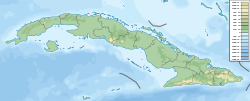| Abdallah Mosque | |
|---|---|
Mezquita Abdallah | |
 | |
| Religion | |
| Affiliation | Islam |
| Ecclesiastical or organisational status | Mosque |
| Status | Active |
| Location | |
| Location | Havana, La Habana |
| Country | Cuba |
Location of the mosque in Cuba | |
 Interactive map of Abdallah Mosque | |
| Coordinates | 23°08′21.6″N82°20′57.3″W / 23.139333°N 82.349250°W |
| Architecture | |
| Type | Mosque |
| Completed | 2015 |
The Abdallah Mosque (Spanish : Mezquita Abdallah) is a mosque in Havana, La Habana Province, Cuba.
